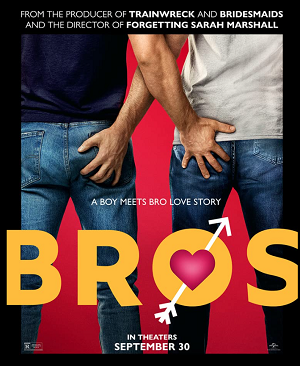With the movie failing to find much of an audience, the director and lead actor blame homophobia, because that’s far easier than accepting that rom-com movies are quaint, out-of-date, and stale in the modern hookup culture:
In the case of movies, one might respond to Stoller and Eichner by saying that entertainers are supposed to provide products that the viewing public wishes to see. It might surprise the team behind the didactic Bros that many of us watch movies to be entertained, not to be preached at, seeing them as brief, trivial moments of escape from the drudge of daily life, not an opportunity to (as the Victorians would have said) “improve” ourselves. But even though it has proved an abject commercial failure, the movie is nonetheless instructive in how our culture is changing. And both its production values and its failure are likely signs not of the LGBTQ movement’s influence stalling, but of its remarkable success.
[…]
Romance depends upon sex being costly. It was the difficulty of obtaining sex, the need for that delicate, complicated, and unpredictable interpersonal dance between two people, that was the very essence of what it was to be romantic. In a world where sex is not simply casual but remarkably cheap, the notion of romance is dead. Romance requires a particular kind of culture in order to make sense. A world of hookups, one-night stands, and all-pervasive pornography is not one that gives people the cultural grammar and syntax to understand it. That the movie apparently contains scenes of sex and nudity is hardly exceptional today. But that’s the point: A world where sex and nudity are displayed on the screen is not a world where romance has any place. Just as explicit rap lyrics reflect a world antithetical to that in which Frank Sinatra sang “Fly me to the moon”, so the endless tedium of explicit sex on celluloid is not that of Audrey Hepburn and Fred Astaire in Funny Face. Romance depends upon social codes of restraint and modesty, and upon the idea that sex is not something casual but something special, even sacred.
The same point can be made with reference to what we might call romantic tragedy. Take Tolstoy’s Anna Karenina. The story simply could not be set in modern America because Anna, married to the tedious Karenin but falling in love with the dashing Vronsky, would simply file for divorce and move out of Karenin’s house and into that of her lover. The tragic romance is rooted in the impossibility of Anna’s situation, given the way sex is seen through the powerful moral lens of nineteenth-century Russian society. The genre of romantic tragedy depends upon a specific moral framework. So does the genre of romantic comedy. But the sexual revolution has obliterated that moral framework.
To return to Bros, it is frankly as ridiculous to make a rom-com in the twenty-first century as it is to hire a cast and crew on the basis of modern categories of identity rather than professional competence. And, while the Bros team might regard its box office failure as discouraging, it might just as easily be evidence of the triumph of the LGBTQ movement in wider society as it is of a residual resistance to the same. Please don’t blame homophobia for your commercial failure. Romance is dead. And you helped to kill it.




